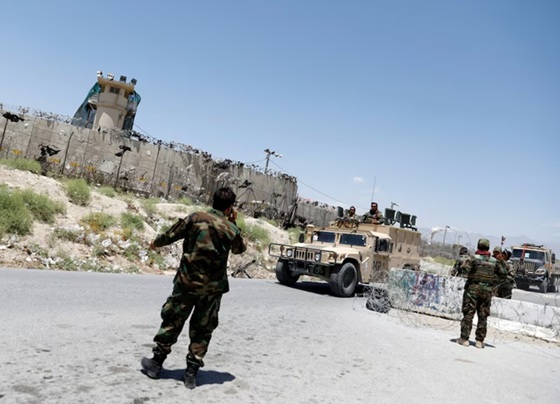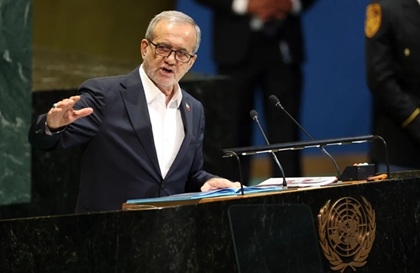As Afghanistan navigates its fourth year under Taliban rule, the United States is quietly but actively shaping its post-withdrawal strategy through a multifaceted approach. A recent U.S. State Department report to Congress, titled *Plans to Support the People of Afghanistan* and submitted on September 22, 2025, reveals ongoing, regular engagements with officials from the fallen Islamic Republic of Afghanistan and the sprawling Afghan diaspora. These interactions, coupled with President Donald Trump’s provocative push to reclaim Bagram Airbase, underscore a delicate U.S. balancing act: maintaining influence in a Taliban-controlled nation without formal recognition, while addressing humanitarian crises and strategic imperatives.
Details of U.S. Engagement
According to the State Department’s report, personnel from its Afghanistan Affairs Unit, based in Doha, Qatar, are meeting “regularly” with former Afghan government officials, Afghan diaspora representatives, and non-Taliban activists both in Afghanistan and abroad. The report specifies that these discussions aim to ensure that counterparts “understand the U.S. policy regarding Afghanistan” while gathering critical insights on the ground situation. These engagements cover a broad spectrum of issues: human rights abuses, media freedom, women’s rights under Taliban restrictions, and the treatment of at-risk Afghans, including journalists, activists, and former government employees.
The State Department also coordinates with international partners, including at the United Nations, to align on strategies that hold the Taliban accountable for commitments made under the 2020 Doha Agreement and to push for an inclusive political system. The Afghan diaspora, estimated at over 2.6 million worldwide with significant communities in the United States, Europe, and Pakistan, plays a pivotal role. Many diaspora leaders maintain deep networks inside Afghanistan, offering the U.S. valuable perspectives on Taliban governance, economic challenges, and security threats like ISIS-Khorasan (ISIS-K).
The Office of the Coordinator for Afghan Relocation Efforts (CARE) facilitates these interactions, focusing on the relocation of vulnerable Afghans, including Special Immigrant Visa (SIV) holders and their families, who face Taliban reprisals. Additionally, the U.S. engages non-Taliban activists in Qatar to monitor local dynamics and inform policy adjustments, ensuring a steady flow of intelligence without direct reliance on Taliban channels. While the report avoids specifics on meeting frequency or participant identities, it emphasizes a collaborative approach with foreign diplomats and regional partners to address issues like money laundering, terrorist financing, and migration flows.
These efforts reflect a pragmatic U.S. strategy: sustaining influence through soft power and diplomacy in a country where its military presence ended abruptly in August 2021.
Importance of the Engagements
The State Department’s outreach is a cornerstone of America’s post-withdrawal Afghanistan policy, serving both humanitarian and strategic objectives. First, it provides a critical channel for intelligence and policy refinement. Former Afghan officials and diaspora leaders offer nuanced insights into the Taliban’s governance failures—such as economic collapse, with Afghanistan’s GDP contracting by 27% since 2020—and security threats, including ISIS-K’s resurgence, which has conducted deadly attacks like the 2021 Kabul airport bombing. These perspectives help the U.S. navigate a complex landscape where the Taliban seeks legitimacy from neighbors like China and Russia (the latter formally recognized the Taliban in July 2025) while failing to curb terrorism or uphold human rights.
Second, the engagements amplify U.S. support for at-risk Afghans. The Taliban’s policies, including bans on women’s education and enforced disappearances of former officials, have drawn global condemnation. By partnering with the diaspora and ex-officials, the U.S. bolsters advocacy for these groups, facilitates refugee resettlement (over 90,000 Afghans have been resettled in the U.S. since 2021), and pressures the Taliban to moderate its stance. This aligns with UN-led initiatives calling for an inclusive Afghan government, a goal the Taliban has consistently resisted.
Third, the diplomatic outreach serves as a counterweight to the Taliban’s growing ties with regional powers. China’s Belt and Road investments in Afghan minerals and Russia’s recognition of the Taliban signal a shifting geopolitical landscape. U.S. engagement with non-Taliban stakeholders signals a “wait-and-see” stance on recognition, leveraging issues like aid, sanctions relief, and counterterrorism cooperation to influence Taliban behavior. This approach also mitigates regional instability risks, such as mass migration and terrorism spillover, which could destabilize allies like Pakistan and Central Asian states.
Finally, these efforts align with domestic U.S. priorities under the current administration. President Trump has emphasized resolving cases of detained Americans in Afghanistan, a topic raised during recent U.S.-Taliban talks. The diaspora’s advocacy strengthens these efforts, ensuring that humanitarian concerns remain central to U.S. policy, even as strategic debates—like the Bagram Airbase question—take center stage.
The Bagram Airbase Aspect
The State Department’s report does not mention Bagram Airbase, but its release coincides with President Trump’s high-profile campaign to reclaim the facility, a former U.S. military stronghold 40 miles north of Kabul. Bagram, which housed up to 40,000 troops during the U.S.-led war, was handed over to Afghan forces in July 2021 and seized by the Taliban a month later. Since then, it has become a symbol of lost U.S. leverage and a focal point of Trump’s Afghanistan rhetoric.
On September 18, 2025, during a press conference with UK Prime Minister Keir Starmer, Trump declared: “We’re trying to get [Bagram] back… because they need things from us,” highlighting its strategic proximity to China’s nuclear facilities in Xinjiang, roughly an hour’s flight away. He escalated this on September 20 via Truth Social, warning: “If Afghanistan doesn’t give Bagram Airbase back… BAD THINGS ARE GOING TO HAPPEN!!!” These statements followed a mid-September U.S. delegation visit to Kabul, led by Special Presidential Envoy for Hostage Affairs Adam Boehler and former Ambassador Zalmay Khalilzad, which focused on detained Americans but reportedly broached Bagram’s return.
The Taliban has firmly rejected these demands. Foreign Ministry spokesman Zakir Jalaly and chief spokesman Zabihullah Mujahid cited the 2020 Doha Agreement, which prohibits foreign military presence, and emphasized Afghan sovereignty. Mujahid urged “realism and rationality,” offering economic partnerships but no territorial concessions.
Unverified April 2025 reports of a U.S. C-17 landing at Bagram with intelligence officials were denied by both sides, and recent satellite imagery shows minimal Taliban activity at the base, which they use for parades and training.
The Bagram push reflects Trump’s transactional approach, potentially linking the base’s return to concessions like aid, sanctions relief, or the March 2025 lifting of bounties on Haqqani network leaders. Strategically, Bagram’s recapture could restore U.S. surveillance and rapid-response capabilities against ISIS-K and counter Chinese influence in Afghan infrastructure.
However, it risks escalating tensions with the Taliban and undermining the State Department’s diplomatic efforts with the diaspora and former officials. These engagements prioritize human rights and inclusivity, which could be sidelined by a focus on military re-engagement.
Broader Implications and Challenges
The U.S.’s dual track—diplomatic engagement with exiles and pressure for Bagram—highlights the complexities of its Afghanistan policy. The State Department’s meetings foster a long-term vision of an inclusive Afghanistan, leveraging the diaspora’s influence and former officials’ expertise. Yet, Trump’s Bagram rhetoric, rooted in immediate strategic and symbolic gains, could provoke Taliban backlash, complicating hostage negotiations and humanitarian efforts. The Taliban’s defiance, backed by regional players, suggests that Bagram’s return is unlikely without significant concessions, which the U.S. has not publicly outlined.
Moreover, the diaspora and former officials may view a Bagram-centric policy as a betrayal of their advocacy for human rights and resettlement, potentially fracturing trust in U.S. intentions. The administration must also navigate domestic pressures, with critics arguing that focusing on Bagram distracts from urgent issues like Afghan refugee backlogs and ISIS-K’s growing threat.
Conclusion
The U.S. State Department’s regular engagement with former Afghan officials and the diaspora reflects a strategic, low-profile effort to maintain influence in a Taliban-ruled Afghanistan. These interactions provide critical intelligence, support vulnerable Afghans, and counterbalance the Taliban’s regional alignments, all while aligning with UN and humanitarian goals.
However, President Trump’s push for Bagram Airbase introduces a volatile element, risking conflict with the Taliban and complicating diplomatic efforts. U.S. faces a pivotal moment: balancing its humanitarian commitments with strategic ambitions in a region where its leverage is limited but its stakes remain high. The path forward will test America’s ability to blend diplomacy with pragmatism in a fractured, post-war Afghanistan.
Discover more from Defence Talks | Defense News Hub, Military Updates, Security Insights
Subscribe to get the latest posts sent to your email.





